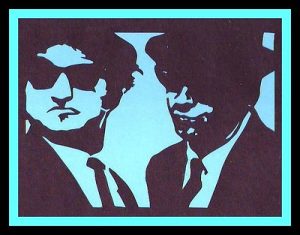
A Curious Song
I’ve always liked the popular swing number ‘Mack the Knife’ since I first heard it over 50 years ago. Since there are few songs out there that attempt to glorify murder, I was particularly drawn to its tale of gore. So, how did the song’s unusual lyrics come about and exactly who is the ‘Mack the Knife’ character?
Louis Armstrong released a well-received jazz version of ‘Mack the Knife’ in 1955. However, Bobby Darin greatly popularised the song by taking it to the No.1 spot on the US Billboard chart in 1959. Since the 1950s, the song has been recorded by multiple artists from across the music spectrum. The list includes such iconic singers as Frank Sinatra, Ella Fitzgerald, Bing Crosby, Tony Bennent, David Cassidy, Sting, Michael Buble and Robbie Williams. However, the origins of the ‘Mack the Knife’ persona, also known as Macheath, go back much further than the last 70 years.
The Beggar’s Opera
Macheath’s character first appears in John Gay’s satirical composition ‘The Beggar’s Opera’ of 1728. Gay popularised his work by taking the tunes of contemporary folk songs and changing the lyrics to fit the storyline. In The Beggar Opera’s production, Macheath is depicted as a chivalrous highwayman. His character is largely thought to have been inspired by the real-life thief, pickpocket and highwayman Jack Sheppard (1702–24). Sheppard, who famously abhorred violence, was best known for his spectacular escapes from London’s most notorious prisons. His daring feats greatly embarrassed the government, and thus, earned him hero status among the underclasses.
Macheath Resurrected
Captain Macheath was first resurrected in 1777 in the ballad opera ‘Polly’. The sequel to ‘The Beggar’s Opera’ is scripted by John Gay with the music by Johann Christoph Pepusch. The ballad opera was not able to be performed until after Gay’s death due to censorship. The production tells of the adventures of Polly Peachum (from the Beggar’s Opera) in the West Indies. In the storyline, Macheath follows Polly to the West Indies where he becomes a pirate.
Macheath next surfaced in Pierce Egan’s ‘penny dreadful’ feature Captain Macheath: The Highwayman of a Century Since (1841). The Penny Dreadful magazines were Britain’s first mass-produced works of sensationalised fiction. Tales of the adventures of highwaymen in the periodicals were particularly popular with the public. Macheath next gets a mention in Charles Dickens’s novel ‘Little Dorrit’, first published in serial form between 1855 and 1857. Further accounts of Macheath were anonymously penned in the Tales of Highwaymen (1865–66) and Captain Macheath: The Prince of the Highway (1892).
The Threepenny Opera and ‘Mack the Knife’
Macheath’s next reincarnation was by the German playwright Bertolt Brecht in ‘The Threepenny Opera’ (1928). The drama’s music was written by the German-American composer Kurt Weill. In a reimagination of Gay’s work, Brecht set his version in Victorian London, turning Macheath into a vicious, sinister character. His shocking crimes included rape and child murder.
In the opera, the menacing Mackie Messer (Mack the Knife) is introduced to the audience by delivery of a *Moritat. The song was only added in the 11th hour at the insistence of the starring actor Harald Paulsen, who wanted to give Macheath more prominence. However, rather than sung by Macheath, Brecht and Weill decided the song would be more effective if delivered by the police chief character. The resultant number was the much heralded ‘Mack the Knife’.
*Moritat – a traditional medieval ‘murder’ type ballad performed by a wandering minstrel.
Film and Stage Productions
Opening scene from G.W. Pabst’s 1931 film: The Threepenny Opera
America was introduced to ‘The Threepenny Opera’ via the big screen. The German film depicting the ballad opera was directed by G.W. Pabst and opened in New York in 1931. The first English-language stage production of The ‘Threepenny Opera’ opened on Broadway in 1933. However, this initial production was a disaster and closed after a run of only ten days. The best-known English translation of ‘Mack the Knife’ comes from Marc Blitzstein’s 1954 version of the ballad opera, which ran Off-Broadway for over six years.
The first verse of the song (to become the standard) read:
Oh, the shark has pretty teeth, dear,
And he shows them pearly white
Just a jack-knife has Macheath, dear
And he keeps it out of sight
In this Americanised version of the song, Macheath, whilst still a killer, is given a somewhat jauntier persona. And, while there are many interpretations and translations of Brecht’s song, Blitzstein’s lyrics have much become the standard.
The second Broadway production of The Threepenny Opera by the New York Shakespeare Festival in 1976 was considered a hit. Notably, ‘Sting’ recorded ‘The Ballad of Mac the Knife’ as his B-side for release on his 1986 single ‘Moon Over Bourbon Street’.
In 1963, a French-German film production of ‘The Threepenny Opera’, directed by Wolfgang Staudte was released. The 1989 film ‘Mack the Knife’, written and directed by Menahem Golan, gave the story a romantic comedy twist. The opening scene saw ‘The Who’ frontman Roger Daltrey, deliver a hushed low-key version of the famous song.
Header image credit: Creative Commons/PDM 1.0 Universal





